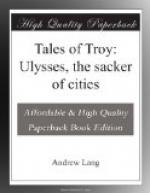Now the story is told that Ulysses was very unwilling to leave his island and his wife Penelope, and little Telemachus; while Penelope had no wish that he should pass into danger, and into the sight of Helen of the fair hands. So it is said that when two of the princes came to summon Ulysses, he pretended to be mad, and went ploughing the sea sand with oxen, and sowing the sand with salt. Then the prince Palamedes took the baby Telemachus from the arms of his nurse, Eurycleia, and laid him in the line of the furrow, where the ploughshare would strike him and kill him. But Ulysses turned the plough aside, and they cried that he was not mad, but sane, and he must keep his oath, and join the fleet at Aulis, a long voyage for him to sail, round the stormy southern Cape of Maleia.
Whether this tale be true or not, Ulysses did go, leading twelve black ships, with high beaks painted red at prow and stern. The ships had oars, and the warriors manned the oars, to row when there was no wind. There was a small raised deck at each end of the ships; on these decks men stood to fight with sword and spear when there was a battle at sea. Each ship had but one mast, with a broad lugger sail, and for anchors they had only heavy stones attached to cables. They generally landed at night, and slept on the shore of one of the many islands, when they could, for they greatly feared to sail out of sight of land.
The fleet consisted of more than a thousand ships, each with fifty warriors, so the army was of more than fifty thousand men. Agamemnon had a hundred ships, Diomede had eighty, Nestor had ninety, the Cretans with Idomeneus, had eighty, Menelaus had sixty; but Aias and Ulysses, who lived in small islands, had only twelve ships apiece. Yet Aias was so brave and strong, and Ulysses so brave and wise, that they were ranked among the greatest chiefs and advisers of Agamemnon, with Menelaus, Diomede, Idomeneus, Nestor, Menestheus of Athens, and two or three others. These chiefs were called the Council, and gave advice to Agamemnon, who was commander-in-chief. He was a brave fighter, but so anxious and fearful of losing the lives of his soldiers that Ulysses and Diomede were often obliged to speak to him very severely. Agamemnon was also very insolent and greedy, though, when anybody stood up to him, he was ready to apologise, for fear the injured chief should renounce his service and take away his soldiers.




